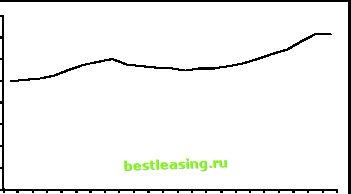

 |
 |

|
Промышленный лизинг
Методички
TABLE 9.2 Is Your Home Overvalued?
The answer is that houses share many characteristics with stocks. Houses offer more potential for gain and better tax treatment than stocks. While the higher potential gain in houses should come with more risk, this has not been the case over the last decades. So what is the right P/E for housing? Based on the characteristics of risk, return, taxes, and inflation protection, housing investments look similar or better than stocks. In addition, the finite supply of land might argue for a bit of a premium. Based on this analysis, housing could command a fair P/E as high as 30. Housing P/Es are categorized in Table 9.2. Salt to Taste As we all learned in elementary school, the three keys to real estate are location, location, location. While there is a single market for IBM stock, there are many, many different markets for real estate. While we have just made some general conclusions about fair value for a house, those P/E categories should obviously be adjusted for local circumstances. When people look at real estate at a local level they tend to analyze by city and region. We can read that housing prices have gone up by 15% in Phoenix, but declined in Buffalo. In reality, however, location is a much more fined-grained notion than an entire city. My friend Jon, who lives in Charlotte, North Carolina, learned the importance of location (and timing) over the last several decades. He sent me an e-mail summarizing his real estate experiences. The e-mail entitled, financial frustration said: I bought a condo in 1985, when I was single, two blocks from my office [in downtown Charlotte] for convenience for $60,000. The property lost value for years while houses two miles away gained in value. I sold the condo in 1993 after getting married in 1992 for $84,000 and bought a home for $180,000. Seven years and two children later, I sold this home for a small loss after significant improvements. Finally, I bought my current house for $360,000 just as the economy was slowing (June 2001). My original condo is now worth more than $200,000! Jon has owned real estate since 1985 in a booming market. Nevertheless, due to family changes he has almost magically missed out on making money; his timing and movements missed the micro trends within his area. So there is much more to location than a city or region. In my own building, for example, the properties on different floors and on different sides of the building have performed differently. Accordingly, our valuation ranges should be combined with knowledge of local conditions. Just as an above-average P/E may be appropriate for the stock of a super rapidly growing company, a property in the right location can justify high valuations. Is There a Housing Bubble? A glance through a bookstore can produce some serious fears about housing prices. Titles such as The Coming Crash in the Housing Market and How to Profit from the Coming Real Estate Bust are likely to get any homeowners pulse racing. Are we experiencing a housing bubble and, if so, will the bubble crash? There are some compelling clues that allow us to make a judgment as to the existence of a housing bubble. Clue #1: Housing Prices Have Risen Far Faster Than Rents There is no nationwide housing P/E. While we dont know the absolute value of the P/E we know that it has risen by 43% since 1982. Figure 9.2 graphs the rate of increase in housing prices divided by the rate of increase in rents. Since 1982, housing prices have risen 43% more than rents. My wife and I have had a similar experience with our property. The market price of our condominium has almost doubled in just the last 5 years. In the same period, rents in our building have increased by about 20%. So housing prices have risen faster than rents. Does this mean that current housing prices are too high? No. It could be that housing prices were too low back in 1982. What is unavoidable, however, is that relative to rents, real estate is less attractive today than it has been at any time over the last several decades. 160 140 120 100 80 60 40 20 0  * annualized from first part of year FIGURE 9.2 U.S. Housing Prices Have Risen Faster Than Rents Source: Office of Federal Housing Enterprise Oversight, Bureau of Labor Statistics 1 2 3 4 5 6 7 8 9 10 11 12 13 14 15 16 17 18 19 20 21 22 23 24 25 26 27 28 29 30 31 32 33 34 35 36 37 38 39 40 41 42 43 44 45 46 47 48 49 50 51 52 53 54 55 56 57 58 59 60 61 62 63 64 65 66 67 68 [ 69 ] 70 71 72 73 74 75 76 77 78 79 80 81 82 83 84 85 86 87 88 89 90 91 92 93 94 95 96 97 98 99 100 101 102 103 104 105 |